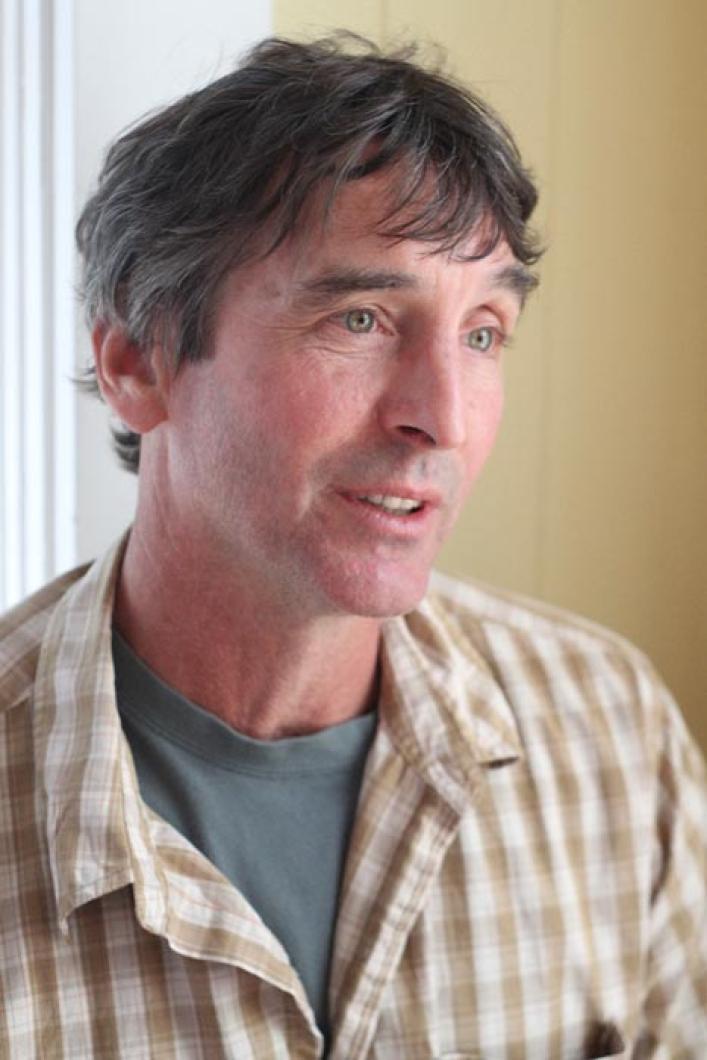If there were never another fire in Aquinnah, deputy fire chief Jim Vercruysse would be happy. The prospect of firefighting is not what draws him to the department. He’s a volunteer, like everyone else on the squad, and that means dedication to something greater than himself — his town.
All volunteer fire departments depend on committed people like Mr. Vercruysse, and perhaps nowhere more than in the tiny town of Aquinnah, where currently there are just seven other firefighters on the squad. More volunteers are needed, no question about it, Mr. Vercruysse said.
“I would like to shoot for 10 to 12, but they don’t necessarily have to be all firefighters,” he told the Gazette this week in an interview at the Little House Cafe in Vineyard Haven. “Everyone has a different level of commitment, some people will be at every training, every drill and there are some people who come once a month. When their pager goes off they’ll show up, it’s just like anything else, they’re volunteers.” He added: “Just last week we had three new people which is just incredible. They’re all experienced so it’s going to be a nice, easy transition to come into our system.”
In the months ahead more change will come to this rural fire department in the extreme western reaches of the Island. After 17 years on the job, fire chief Walter Delaney is retiring at the end of October, and Mr. Vercruysse will step in as chief effective Nov. 1.
Speaking about the challenges facing small-town fire departments today, Mr. Vercruysse said the difficulty in increasing the ranks isn’t in recruiting, but retention.
“People always say they’re going to do it but when they realize the commitment they just don’t show up,” he said. “It’s a big commitment.”
Volunteers wear pagers 24 hours a day and must be ready to respond on a moment’s notice. They’re trained on all the equipment and some are trained to drive the trucks — Aquinnah has three. At least two people are needed to drive each truck.
But being a volunteer firefighter doesn’t necessarily mean you have to put on the gear and hoist a hose. Driving the fire trucks, directing traffic or raising money are all vital volunteer positions, Mr. Vercruysse said.
He said the department usually responds to a few calls per week during the summer, many of which are false alarms. Off-season is often busier.
A good leader among his volunteer recruits, Mr. Vercruysse takes the 7 p.m. to 7 a.m. shift every night, and has been for the past few years. The 2 a.m. calls are the ones every emergency responder likes the least, and he is no exception.
“Those are the rough ones,” he said. “[The police] go to every call we go to. Sometimes it’s a race to get there before them but I’ve never been able to beat them yet. They’re quicker, a lot of times I’m in bed when I get the call and they’re on the road.”
After every fire call, the two departments meet to debrief. When there is a motor vehicle accident, the fire department responds to stabilize the situation, Mr. Vercruysse said, after which police take charge of the scene.
Aquinnah has not seen a structure fire in four or five years; Mr. Vercruysse remembers a period when they were much more prevalent.
“In the late 1990s we had a whole series of structure fires — everyone on the Island thought, what is going on with Aquinnah,” he said. “There were all these different circumstances, lightning strikes, someone left a fireplace going, electrical issues, they were just complete destructions of houses. We haven’t had any of that lately.”
In fact it was a 1994 fire that moved Mr. Vercruysse and others to join the department.
“There was a major fire near where I lived and I could see the flames and I went out to see if I could help and there were only two firefighters in town so they could only bring one truck; they didn’t have enough people to fight the fire,” he said. “It was just scary, and I thought, that could have been my house.”
At one point Mr. Vercruysse said the department had 12 or 14 firefighters. But then people began to move away, lose interest or retire due to health issues.
“It can be pretty demanding physically, you have to put on a lot of gear and you’re expected to go into burning buildings,” he said. “You have to be prepared for it.”
Calls in recent weeks included one to help someone in the middle of the woods who had fallen from a tree, and another where lightning struck a tree, cracked it in half and caused it to fall onto a propane tank.
“The homeowner panicked and was out there with a little saw trying to saw the tree,” Mr. Vercruysse said. “You have to deal with that and caution them that it’s dangerous. You can’t be playing around there, and they can panic so you have to be a bit of a social worker and yet try to keep the situation safe at the same time and communicate, which is always the biggest issue.”
And the soon-to-be chief had warm words of praise for Mr. Delaney, the longtime outgoing chief.
“He has been so amazing,” Mr. Vercruysse said. “We have the most maintained station on the Island. You can just ask any fire department and they’ll rave about our station.”




Comments (1)
Comments
Comment policy »